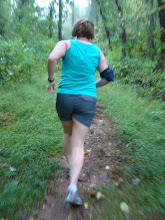
Right this moment, the second-most emailed story on the NY Times website is this one, by Mark Bittman, about the eating habits of Scott Jurek: http://www.nytimes.com/2010/05/13/sports/13runner.html.
For those of you who haven't heard of him, Jurek is one of the most accomplished ultramarathoners in the world. He runs (and wins) the most extreme races out there, like the Badwater Ultramarathon (135 miles through the heat of Death Valley) and the Spartathlon (153 miles between Athens and Sparta in Greece). He's also a vegan. Jurek features very prominently in Christopher McDougall's excellent memoir Born To Run (http://amzn.com/0307266303) about a group of ultramarathoners who travel to Mexico to meet (and race with) members of a tribe fabled for its super-athletes.
When I read Born to Run, I was really intrigued by Jurek's philosophy on food. Like me, he's not a fan of artifical performance foods, like energy gels. Instead, he packs real food to fuel his runs. I tend toward raisins and cereal; Jurek apparently loads a fanny pack with hummus and pita. I have to admit, though, that I'm skeptical I could follow Jurek's lead and fuel my long runs with salad, quinoa, and tofu. I tend to do best when I load up on both carbs and protein, which is what makes me think about incorporating a little meat back into my diet as I prepare for my first marathon.
This meat question has been worrying me for awhile now. I'm not opposed to the practice of eating meat in general. I am opposed to the prominence of meat in the western diet, with its corresponding environmental and health costs. In theory, I have no problem with the occasional consumption of responsibly raised and managed meat. I've been vegetarian for so long, though, that eating meat just doesn't appeal to me anymore. Every once in awhile, I'll eat a little by accident, and its not a pleasant experience. Still, the more I work out, the more I crave protein, and I think I would feel better getting it from some natually-raised turkey than from the super-processed faux "chick'n" nuggets I eat now. I also saw a show on Discovery Health where a group of vegetarian women athletes agreed to eat meat for a month and see if it improved their performance. It did. A lot.
I'm still not sure what I'm going to decide about this. I assume it will work itself out over the course of my training. Either way, Born to Run was a comforting read. The group of superathletes who run the climactic race in the book include Jurek, the vegan; the Mexican runners, who eat chia seeds, corn meal, and a home-brewed beer; two 20 year-olds who seem to consume nothing but booze, Coke, and candy; and the author, who eats lots of healthy, natural food and then supplements it with performance bars and gels. They all finish the race. So, in the end, I don't think there is one magic food formula for every runner. I just need to figure out mine.

No comments:
Post a Comment
Your comments are welcome, but please keep in mind that my profs, classmates, colleagues, and church friends may be reading and keep it appropriate. Thanks!